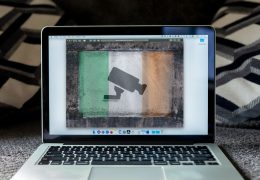E-passport at risk of being targetted by terrorists.
Digital Rights Ireland director, Antoin O’Lachtnain, in an interview with Mark Tighe of the Sunday Times today, gave an insight into the possibilities of Ireland’s new electronic passport being targetted by criminals.
The lack of security measures, protecting the passport from being “skimmed”, are a real risk, exposing these passports to the possibility of being read and the contents copied by terrorists.
Recent press coverage has exposed the security risks associated with electronic passports.
‘Terror risk’ for electronic passport
Mark Tighe
THE new Irish e-passport is lacking a basic security feature contained in the American version, leaving Irish passport holders open to targeting by terrorists, according to a leading lobby group.Digital Rights Ireland (DRI) claims the lack of any shielding in the passports means “skimmers” will be able to detect the passports from picking up their frequencies, and even identify nationality, without the holder knowing.
The new passports were launched last week by the Department of Foreign Affairs, ahead of a US deadline requiring countries on its visa-waiver programme to start issuing passports with a radio transmitter chip (RFID) from Tuesday. The department expects to issue 750,000 by the end of 2007.
While the chip is meant to be read from only a few centimetres, prototype testing showed they could be detected up to 9m (30ft) away. This led the US State Department to introduce a metal mesh in the passport cover to “make unauthorised reading of the passport very difficult from any appreciable distance as long as the passport is closed”.
An encryption system prevents skimmers from accessing the biometric data on the chip but security firms have demonstrated that a hand-held scanner is able to identify the presence of unshielded passports. Researchers are examining whether it will be possible to identify the passport nationality.
Antoin O’Lachtnain, a director of DRI, said it was unbelievable Ireland did not follow America’s lead in providing shielding. “The only reason we are implementing the e-passport is because the Americans told us we had to,” he said. “I really think e-passport holders should use a shield, such as a piece of tinfoil, to prevent the RFID chip being read without their knowledge.”
Some companies are already offering special wallets with shields to protect passports against skimmers.
O’Lachtnain said skimming technology would advance over the planned 10-year lifespan of the passports. “Terrorists could use a scanner to identify a group of, say, British or American nationals by the passport they are carrying and then kidnap them or kill them in a suicide bombing,” said O’Lachtnain.
The Department of Foreign Affairs said shielding was not necessary as the passports must be open at very close proximity to the reader. A source at the International Civil Aviation Organisation said: “I think it will not be long before other countries move to implement similar shielding.”

